Elections 2016
• Dysfunctional Political Process Requires Alternative of Politics of Empowerment
•
Discrediting Presidential Elections Deepens Possibilities for Federal Intervention and Civil War
• Justice Department Reduces Federal Observers at Polling Places for Presidential Election
• Polling Places Shuttered on "Massive Scale" • Felony Disenfranchisement • Cultural Expressions of Civil War Scenarios
Police State Direction of the Rich is No Solution
Dysfunctional Political Process Requires Alternative of Politics of Empowerment
 As the 2016 elections come to a close, the utter dysfunction of the existing political process has shown itself. It produced Trump and Clinton, candidates disliked and unwanted by the large majority. Major concerns of the people, like imperialist war, destruction of the environment, inequality and poverty have not been addressed, let alone having solutions proposed. The entire process, including the primaries, vast sums spent on negative advertising, the unending scandals and mudslinging, cannot even be called political. On the contrary, political discourse to inform the public and assist in sorting out the various conflicts and finding solutions to problems is exactly what is absent.
As the 2016 elections come to a close, the utter dysfunction of the existing political process has shown itself. It produced Trump and Clinton, candidates disliked and unwanted by the large majority. Major concerns of the people, like imperialist war, destruction of the environment, inequality and poverty have not been addressed, let alone having solutions proposed. The entire process, including the primaries, vast sums spent on negative advertising, the unending scandals and mudslinging, cannot even be called political. On the contrary, political discourse to inform the public and assist in sorting out the various conflicts and finding solutions to problems is exactly what is absent.
Indeed, the process is serving to depoliticize people, to impose the notion that politics have no place. It is serving to further divide the people and divert them and their various fighting organizations from the struggle against U.S. war and aggression and for the rights of all. We are to debate which candidate is worse, rather than discussing and taking up steps needed now to advance the alternative of politics of empowerment. Unlike the existing set-up of the rich, this is an alternative that is in our hands to create and develop, an alternative that takes us in the direction of empowering the people themselves to govern and decide.
The rich are doing everything to block such a direction. In a situation where Congress is already dysfunctional, the political parties of the rich are also not just dysfunctional but virtually being eliminated with this election. The elections themselves are being discredited, with claims of fraud. The possibility of civil war is coming to the fore, as seen by various high-level military forces lining up behind each candidate and the FBI contending alongside other policing agencies. Federal intervention in the elections or after is possible, in the name of ending fraud or voter suppression. This too could contribute to a civil war scenario, as states refuse such federal actions.
The answer of the rulers is not to modernize the democracy and put decision-making in the hands of the people. Instead it is new arrangements that impose a government of police power, and with it a president who is Commander-in-Chief, not only of the military but of the people as well (see article below, “Discrediting Presidential Elections Deepens Possibilities for Federal Intervention and Civil War”). It is an arrangement that has no need of political parties and relies instead on a public life where individual leaders, with their individual machinery, are selected. Then each person is to have a direct relationship with the leader. Obama has already done much to engage people in this “direct” relationship, using the White House webpage and other social media. There is no need for political discourse, no collective or social concerns. What is indispensable is the Commander-in-Chief with power to use force with impunity, at home and abroad. Presenting herself as such a Commander, Clinton emphasizes she is supposedly what stands between us and the apocalypse.
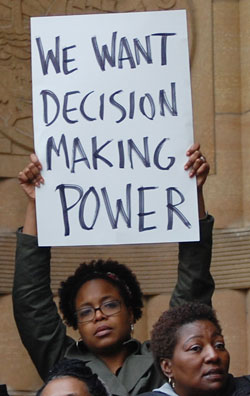 The undemocratic and backward direction of the imperialist rich is to eliminate a government of laws and put in its place government of police power. This is further evidenced in the repeated military-like response to protest. There is no upholding of law, no political solutions offered, but rather increasing violence and impunity. The situation at Standing Rock with the Sioux nation corageously standing to defend their sovereignty and water for millions of people is but the latest example. Federal actions against various laws and treaty rights, police armed and acting like soldiers facing enemies, mass arrests, use of tanks, helicopters, pepper-spray, torture and more has occurred. The situation abroad is no different, with use of drones and Special Forces to kill and destroy, putting whole nations at risk. It is not government of laws. It is government of police power that requires not a civilian president concerned with the needs of society, but a Commander-in-Chief imposing U.S. dictate through use of force.
The undemocratic and backward direction of the imperialist rich is to eliminate a government of laws and put in its place government of police power. This is further evidenced in the repeated military-like response to protest. There is no upholding of law, no political solutions offered, but rather increasing violence and impunity. The situation at Standing Rock with the Sioux nation corageously standing to defend their sovereignty and water for millions of people is but the latest example. Federal actions against various laws and treaty rights, police armed and acting like soldiers facing enemies, mass arrests, use of tanks, helicopters, pepper-spray, torture and more has occurred. The situation abroad is no different, with use of drones and Special Forces to kill and destroy, putting whole nations at risk. It is not government of laws. It is government of police power that requires not a civilian president concerned with the needs of society, but a Commander-in-Chief imposing U.S. dictate through use of force.
Clinton is expected to become this Commander-in-Chief and is doing what she can to convince all concerned to follow her in this dangerous direction. But she is not what is indispensable. It is we, the people, who are indispensable, in finding a way forward and blocking the disastrous direction the rulers are striving to impose. It is by advancing our own politics of empowerment, politics that are anti-war and pro-social, that defend the rights of all at home and abroad, that a path forward can be forged. This battle is in our hands to decide!
[TOP]
Discrediting Presidential Elections Deepens Possibilities for Federal Intervention and Civil War
Both presidential candidates Trump and Clinton are discrediting the elections. Trump repeatedly claims election fraud is afoot. He focuses on voter fraud by individuals, targeting immigrants in particular. He has called for his supporters to go to the polls to challenge voters, which they are free to do. He has also called into question the results themselves, indicating Clinton and her allies could rig the election and he may not accept the outcome if he does not win. One of the super political action committees (super PAC) carrying out fundraising for Trump is even called "Stop the Steal." He persists in claiming fraud by voters is an important issue, even though prosecutions for voter fraud are rare. Only 31 cases of voter impersonation out of a billion votes cast have been exposed. The Trump aim is to sow doubt, not guarantee the right to vote.
Hillary Clinton has filed lawsuits concerning voter intimidation in four "battleground states" — Ohio, Arizona, Nevada and Pennsylvania. The lawsuits contend Trump and his supporters are "conspiring to threaten, intimidate, and thereby prevent minority voters in urban neighborhoods from voting." The lawsuits cite the 1965 Voting Rights Act and the 1871 Ku Klux Klan Act. The effort here is to make Clinton appear concerned about voter suppression, especially the voting rights of African Americans. The limiting of the suits to only four states, leaving out states like North Carolina, Texas and Florida where government officials are acting to disenfranchise voters, indicates Clinton's actions, like Trump's, are self-serving — to sow doubt about the outcome rather than extend and guarantee the right to vote.
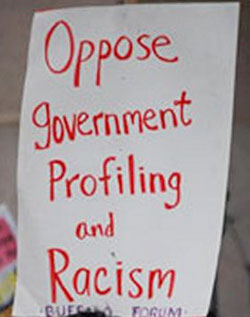 Actions by both candidates have as a main impact the discrediting of elections, increasing the possibility of federal intervention in contradiction with various state authorities. Both candidates ignore the main ways voters are disenfranchised. This includes voter registration laws aimed at blocking African Americans especially and working people more generally from voting. A large portion of eligible voters, estimated at one third of the voting-age population, are not allowed to vote because they are not registered.
Actions by both candidates have as a main impact the discrediting of elections, increasing the possibility of federal intervention in contradiction with various state authorities. Both candidates ignore the main ways voters are disenfranchised. This includes voter registration laws aimed at blocking African Americans especially and working people more generally from voting. A large portion of eligible voters, estimated at one third of the voting-age population, are not allowed to vote because they are not registered.
From its beginning, the U.S. set-up has served to block people from voting — not ensure the right to vote. Today, one way this occurs is through strict voter ID laws, which have been imposed in fourteen, mainly southern states. The North Carolina National Association for the Advancement of Colored People (NAACP), for example, filed a federal lawsuit on October 31, seeking an immediate injunction to stop the state and various county boards of elections from illegally canceling the registrations of thousands of voters, disproportionately impacting African Americans.
According to a 2016 Sentencing Project study, voter suppression includes blocking more than 6.1 million prisoners and ex-prisoners from voting countrywide with almost 600,000 disenfranchised in Florida alone. This suppression disproportionately impacts African Americans who contend with racist mass incarceration nationwide. Removing voters from the rolls, limiting the number of polling places and moving them on Election Day, which causes longer lines and frustration, are other means to disenfranchise voters. These are all far more serious problems that voters face in the struggle to affirm their right to vote than the few cases of individual fraud. But the two candidates are not addressing these systemic problems arising from government actions not individuals.
Why then the focus on voter fraud and voter intimidation? It serves to discredit the elections even further in conditions where people are already angry about the situation. Targeting particular states, as both Trump and Clinton are doing, opens the possibility of calling for more federal intervention to ensure the elections are "fair." This possibility is underlined by the actions of the Department of Justice (DoJ). The DoJ commonly sends hundreds of observers and poll watchers to various polling stations across the country, as a means to prevent voter intimidation. In 2012, the DoJ sent 780 specially trained observers to polling places in 51 jurisdictions in 23 states. This year a much smaller number of observers, with full authority to access the polls, will go to five states (Alabama, Alaska, California, Louisiana and New York). For the 14 states with strict new laws, mostly requiring special ID to present at the polls as well as additional registration requirements, the DoJ will not send any observers.
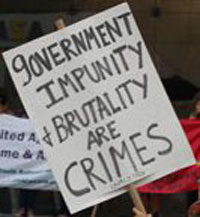 With the likelihood of untrained forces from both the Clinton and Trump campaigns being at the polls where new laws are being implemented in addition to the long history of serious attacks on the right to vote mostly by state officials, the DoJ has decided to be absent. In this way, the DoJ can blame the states for any confusion, disruptions and claims of fraud at the polls.
With the likelihood of untrained forces from both the Clinton and Trump campaigns being at the polls where new laws are being implemented in addition to the long history of serious attacks on the right to vote mostly by state officials, the DoJ has decided to be absent. In this way, the DoJ can blame the states for any confusion, disruptions and claims of fraud at the polls.
Together with the widespread discrediting of the election by both candidates, this provides a means to justify a federal takeover of elections, or at least more federal intervention in them. While this has the appearance of defending the right to vote, in fact it opens a space for the federal government to occupy, presenting changes to the electoral set-up as being more democratic while blocking the people from themselves changing the set-up to favor their empowerment. Further usurping power from the states is also consistent with the direction of a Commander-in-Chief as leader and holder of police powers for the country. It also creates a civil war scenario, if and when states refuse to accept federal control.
In the U.S, for the presidency to be able to control the many policing agencies is no small matter, especially those currently controlled by the cities, counties and states, including the state National Guard. Within the military itself, splits have appeared as seen by the various Generals and Admirals backing either Clinton or Trump. A traditional job of the president is to unite the divisions within the military forces to preserve the union and present a united front of the imperialist rich capable of blocking the working people from coming to power.
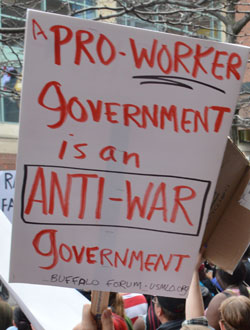 In today's circumstances, it appears the hope of the ruling imperialists is to impose a Commander-in-Chief of the police power that is recognized as a necessary, even indispensable commander of the working people. In this way they would succeed in preserving the union while demobilizing the people from opposing the destruction of a government of laws and accepting a government of police power, a militarized police state.
In today's circumstances, it appears the hope of the ruling imperialists is to impose a Commander-in-Chief of the police power that is recognized as a necessary, even indispensable commander of the working people. In this way they would succeed in preserving the union while demobilizing the people from opposing the destruction of a government of laws and accepting a government of police power, a militarized police state.
A direction for the state that relies on police power outside a government of laws is unstable, destructive and dangerous. A new direction for political affairs is urgently needed. The people organized to defend their individual and collective interests and the rights of all can mobilize their peers to take up practical politics and wage a conscious battle for a pro-social direction that empowers the people and brings into being an anti-war government.
[TOP]
Justice Department Reduces Federal Observers at Polling Places for Presidential Election
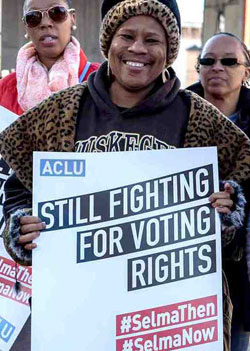 The U.S. Department of Justice (DoJ) is significantly reducing the number of federal observers stationed inside polling places for the November 8 elections. This is taking place in conditions where yet more voters face laws designed to restrict — not increase — the right to vote. More than a dozen states have strict new election laws that will exclude voters, most using ID requirements at the polls, as well as additional registration requirements.
The U.S. Department of Justice (DoJ) is significantly reducing the number of federal observers stationed inside polling places for the November 8 elections. This is taking place in conditions where yet more voters face laws designed to restrict — not increase — the right to vote. More than a dozen states have strict new election laws that will exclude voters, most using ID requirements at the polls, as well as additional registration requirements.
The U.S. from its origins has organized to reduce voter participation through various means. These include, today and in the past, voter registration requirements that are systematically racist, geared toward keeping African Americans from participating in the political life of the country. Current laws also target students, the elderly and more generally, as in the past, those who are poor.
The new laws include requirements for presenting only government-approved forms of photo identification at the polls. The requirements are expected to lead to disputes. As well, Donald Trump has called for his supporters to police the polls themselves and is specifically targeting Latinos. The Democrats also are expected to have observers. Both candidates and parties can send observers inside polling stations. None of these volunteers have to be trained or knowledgeable about the laws. Many are expected to intimidate or otherwise disrupt voting by slowing the process and generating long lines by questioning each voter.
For the past five decades, the DoJ has sent hundreds of observers and poll monitors across the country, particularly in the mainly southern states that the DoJ was monitoring for discrimination against voters. The DoJ mandate stemmed from the 1965 Voting Rights Act, itself a result of massive struggles in the south and across the country defending the right to vote. A 2013 Supreme Court ruling eliminated a key part of the Act, removing the federal mandate to approve state changes to election laws.
There are 14 states where state poll workers are being asked to implement new laws, including voter ID requirements, for the first time in a presidential election. According to the DoJ, federal observers will not be sent inside polling places in those states.
In the 2012 presidential election, the last before the court ruling, the DoJ sent more than 780 specially-trained observers and other personnel to polling places in 51 jurisdictions in 23 states to watch for unlawful activity and write up reports about possible civil rights violations. This year the DoJ is sending observers, with full access to polling sites to five states — and only because judges have ordered the oversight. While the DoJ states the court ruling prevents them from sending more observers, rights organizations point out the ruling did not specifically mention observers. And they question why the DoJ announced and publicized the fact that they will not be sending observers. (Note that 23 other states will have DoJ monitors, who do not have authority to enter the polling sites unless given permission by state officials).
Repeated experience indicates that even with the federal observers, serious attacks on the right to vote routinely occur on Election Day, much of it by the states themselves. State officials remove eligible voters from the rolls, polling places are moved or removed to favor one or the other party, African Americans are routinely targeted, challenged and more. The entire set up for registration and strict requirements on Election Day are designed not to defend the right to vote, but to block it. The current actions by the DoJ are in part a means to cause confusion and disruptions at the polls, while blaming the states for it. Is it a set-up to justify federal interference or objections to the results in particular states? Perhaps a federal takeover of elections afterwards? In a situation where the battle for the presidency is supreme among the rulers, and fighting among various factions is greatly intensifying, with states playing a role in them, it is necessary to consider the actions of the DoJ and states in electoral matters.
[TOP]
In Louisiana, North Carolina, Texas
Polling Places Shuttered on "Massive Scale"
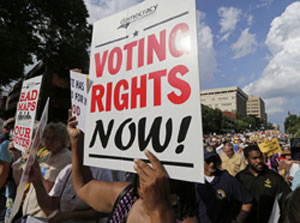 Voters in U.S. counties previously covered by the Voting Rights Act (VRA) will have at least 868 fewer places to cast ballots in the 2016 election than they did previously, according to a new analysis released Friday.
Voters in U.S. counties previously covered by the Voting Rights Act (VRA) will have at least 868 fewer places to cast ballots in the 2016 election than they did previously, according to a new analysis released Friday.
In fact, the report from the Leadership Conference on Civil and Human Rights finds that in the wake of the 2013 U.S. Supreme Court decision gutting the VRA, "[c]ounties and states with known records of voting discrimination are closing polling places on a massive scale."
Many closures happened in places that would have had to gain federal approval to change voting laws prior to the high court's ruling in Shelby County v. Holder, "which made Section 5 of the VRA inoperable and opened the door to racial discrimination at every juncture of the electoral process," as the report explains.
In North Carolina, for example:
Since Shelby, formerly covered counties in North Carolina have closed polling places even after significant opposition from minority communities and advocates. Pasquotank and Cleveland counties are the leaders for polling place reductions in the state even though both have established records of voting discrimination.
And in Texas:
Almost half of all Texas counties in our sample closed polling places since Shelby, resulting in 403 fewer voting locations for the 2016 election than in past years. These closures come as the state’s voter ID law has become a leading example of voting discrimination since Shelby and include reductions in counties like Medina, Caldwell, Nueces, and Galveston — each with established records of discrimination and recent violations of the Voting Rights Act.
While the Leadership Conference acknowledges that "[t]here are justifiable reasons to reduce polling places and consolidations can be executed equitably," it also points out that "the loss of Section 5 means that there is no process to ensure that reductions are disclosed to the public, are conducted with the input of impacted communities, and do not discriminate against voters of color." The report brings out polling place closures including: Texas 403; Louisiana 103; Mississippi 44; Alabama 66; South Carolina 12; North Carolina 27.
The analysis notes that "[p]olling place closures are a particularly common and pernicious tactic for disenfranchising voters of color. Decisions to shutter or reduce voting locations are often made quietly and at the last minute, making pre-election intervention or litigation virtually impossible. These changes can place an undue burden on minority voters, who may be less likely to have access to public transportation or vehicles, given continuing disparities in socioeconomic resources." […]
[TOP]
 A striking 6.1 million Americans are prohibited from voting due to laws that disenfranchise citizens convicted of felony offenses. Felony disenfranchisement rates vary by state, as states institute a wide range of disenfranchisement policies.
A striking 6.1 million Americans are prohibited from voting due to laws that disenfranchise citizens convicted of felony offenses. Felony disenfranchisement rates vary by state, as states institute a wide range of disenfranchisement policies.
The 12 most extreme states restrict voting rights even after a person has served his or her prison sentence and is no longer on probation or parole; such individuals in those states make up over 50 percent of the entire disenfranchised population. Only two states, Maine and Vermont, do not restrict the voting rights of anyone with a felony conviction, including those in prison.
Persons currently in prison or jail represent a minority of the total disenfranchised population. In fact, 77 percent of disenfranchised voters live in their communities, either under probation or parole supervision or having completed their sentence. An estimated 3.1 million people are disenfranchised due to state laws that restrict voting rights even after completion of sentences.
Rights restoration practices vary widely across states and are subject to the turns of political climate and leadership. In Florida, the clemency board voted in 2007 to automatically restore voting rights for many persons with non-violent felony convictions. This decision was reversed in 2011, and individuals must now wait at least five years after completing their sentence to apply for rights restoration. In Iowa, then-Governor Vilsack issued an executive order in 2005 automatically restoring the voting rights of all persons who had completed their sentences, but this order was rescinded in 2011 by Governor Branstad.
Felony disenfranchisement policies have a disproportionate impact on communities of color. Black Americans of voting age are more than four times more likely to lose their voting rights than the rest of the adult population, with one of every 13 black adults disenfranchised nationally. In four states – Florida (21 percent), Kentucky (26 percent), Tennessee (21 percent), and Virginia (22 percent) – more than one in five black adults is disenfranchised. In total, 2.2 million black citizens are banned from voting. […]
[TOP]
Cultural Expressions of Civil War Scenarios
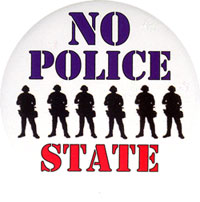 One new television show and the second season of another both start with potential civil war scenarios for the U.S. Both are on ABC, which is owned by Walt Disney. The shows are a reflection of the current reality of contending policing authorities in the U.S., like the military, CIA, FBI and Homeland Security, with contention between them and with the presidency. They also reflect the fact that existing governing arrangements are failing to sort out conflicts among the ruling circles and between them and the peoples here and abroad.
One new television show and the second season of another both start with potential civil war scenarios for the U.S. Both are on ABC, which is owned by Walt Disney. The shows are a reflection of the current reality of contending policing authorities in the U.S., like the military, CIA, FBI and Homeland Security, with contention between them and with the presidency. They also reflect the fact that existing governing arrangements are failing to sort out conflicts among the ruling circles and between them and the peoples here and abroad.
The new show, titled Designated Survivor, begins with the Capitol building being blown up during the State of the Union address, when the whole government is present. The bombing wipes out the entire government — the President and his Cabinet, Vice-President, Congress, Supreme Court. The only one left is the “designated survivor,” the one cabinet member who does not attend just in case such an event happens. His position is what is considered one of the more lowly, inconsequential posts of Housing and Urban Development. He then becomes president. One member of Congress, a woman senator was also designated and she then becomes the only surviving member of Congress. Then another representative is miraculously found in the rubble. So there is one senator and one representative.
The story line that then ensues includes various challenges to the President. It is quickly claimed that a terrorist group did the bombing. One of the military generals wants immediate and swift action against the terrorists who might be responsible. The President wants to proceed more slowly. The appearance is given that the general is conspiring with others to remove the president and replace him with a military person, perhaps himself. Then there is the Governor of Michigan who starts rounding up and arresting all Muslims. The President calls for him to stop. The Governor refuses. The President attempts to federalize the state National Guard to stop the Governor and the General heading Michigan’s Guard refuses to obey and sides with the Governor.
Then of course the FBI pursues an investigation without telling anyone that appears to implicate the surviving representative and the military as being responsible for the bombing. The surviving representative is being positioned to become vice-president.
All of these are very possible scenarios in the present circumstances. And it can hardly be a coincidence that they are being played out on TV now, right during elections.
The President then secures his position, not as a civilian concerned about restoring government, but by being Commander-in-Chief and raiding the group supposedly responsible using SEAL Team Six, capturing the supposed leader of the terrorists. This too is consistent with current conditions, where the president is not so much a civilian responsible to society, but a Commander-in-Chief exercising police power.
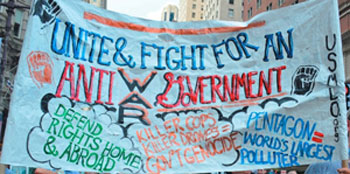 A second ABC show, Quantico, featuring the FBI, has a story line where the G-20 heads of state are meeting in Manhattan and the building is taken over by “terrorists.” The president agrees to negotiate with the “terrorists” , to save his wife and other leaders, negotiations which he says occur all the time, the public just does not know it. However, though he does as asked, his wife is publicly beheaded anyway. FBI agents who have infiltrated the CIA are trying to stop the takeover. Then it turns out the takeover is being conducted by a group of rogue CIA agents! Again, a plot of contending armed policing authorities battling each other and contending with the president.
A second ABC show, Quantico, featuring the FBI, has a story line where the G-20 heads of state are meeting in Manhattan and the building is taken over by “terrorists.” The president agrees to negotiate with the “terrorists” , to save his wife and other leaders, negotiations which he says occur all the time, the public just does not know it. However, though he does as asked, his wife is publicly beheaded anyway. FBI agents who have infiltrated the CIA are trying to stop the takeover. Then it turns out the takeover is being conducted by a group of rogue CIA agents! Again, a plot of contending armed policing authorities battling each other and contending with the president.
The significance here is that when such storylines are openly presented on regular TV shows, it indicates just how close to reality these various civil war scenarios are. And how urgent the aim of organizing for an anti-war government as a means to block such a possibility
[TOP]
